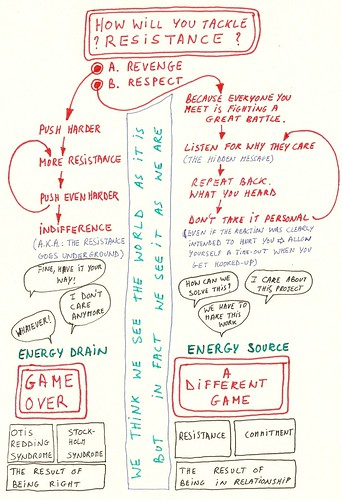I just can’t get a hold of that thing called ‘resistance’. I have tried to define it over and over. And just as much as I have written about it – to that same extent I get hooked by energy draining conflicts, oppositions and being right.
Seems like there is quite a gap between theory, rhetoric, blogging and practice. So one more time I try to clarify my view on resistance; in the first place to get a hold of it myself. Let me know if it works for you too!
Some notes about the drawing:
- Whenever you are confronted with resistance, you should realize that you are the one who perceived and labeled the behavior and the person(s) as resistant in the first place. Perception is everything!
- On the right-hand side of the drawing, the point is to receive the communication. That way you allow the change process to start. You should know that there are lots of communications to receive before you get from resistance to commitment: anger, bargaining, depression and finally, acceptance.
- A lot of ‘R’ words! On the left-hand side, Resistance can follow the Revenge path and thus create a game of being Right. On the right-hand side Resistance can follow the Respect route and thus create a game of being in Relationship.
- I do make references to earlier posts on Indifference (Otis Redding Syndrome, Stockholm Syndrome, etc…)
- The quote in the middle is taken from Stephen Covey.




Pingback: Luc’s Thoughts on Organizational Change » Blog Archive » Rituals and Habits()
Pingback: Luc’s Thoughts on Organizational Change » Blog Archive » Meet my Dad()
Pingback: Luc’s Thoughts on Organizational Change » Horror, the Ultimate Learning()
Pingback: Gamers Will Save Our Economy (Part 7) | Reply-MC()
Pingback: One more time: Resistance is a good thing! | Reply-MC()